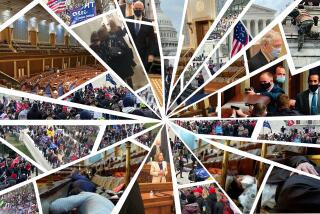Red Ties Abound as Senate TV Coverage Begins
- Share via
WASHINGTON — More than four decades after television revolutionized American culture, the U.S. Senate--the country’s most elite, stodgy and tradition-bound deliberative body--finally premiered live and in color Monday on home screens across the country.
The inaugural broadcast, authorized by senators recently after years of debate, began precisely at 11 a.m. PST, giving millions of cable television viewers their first glimpse of a once-dour chamber brightened by new lights, red ties recommended by media coaches and--on some lawmakers--touches of makeup.
At least one normally mousy-haired senator sported an unusual salmon-colored coiffure, and several others displayed new tans, suits or hair styles as they took to the floor in unusual numbers to outdo each other in heralding what several characterized as the “historic occasion.”
Red Tie Makes Difference
“I heard on the radio this morning that this was the uniform,” Sen. Charles E. Grassley (R-Iowa) confessed to reporters outside the chamber as he stroked his red tie. “I never thought a red tie could make so much difference, but that’s what the experts tell me.”
Carried on C-SPAN
Gavel-to-gavel coverage of House proceedings has been carried in recent years over the government-run C-SPAN channel, which is made available to cable systems and the commercial networks. The Senate action will be presented on a second C-SPAN channel.
Technically, the lawmakers must vote next month on whether to allow the telecasts to continue, but there is little doubt that the cameras will become a permanent fixture in the chamber.
Majority Leader Bob Dole (R-Kan.), whose presidential aspirations could be affected by the increased exposure that televised proceedings will afford him, kicked off Monday’s show by declaring that the Senate was finally catching up “with the 20th Century.” He pleaded with colleagues not to grandstand for the cameras and expressed hope that the new technology would curb excessive oratory.
Missed 200 Years
Next up was Minority Leader Robert C. Byrd (D-W.Va.), who delivered a 15-minute monologue detailing the historic events in the Senate over the last 200 years--which the cameras have missed.
Perhaps the highlight of the broadcast was Alabama Democratic Sen. Howell T. Heflin, who composed a sonnet for the occasion: “Turn the spotlight over here, focus the camera at my place, pages please don’t come too near, otherwise you just might block my face.”
Heflin said the advent of TV had sparked a run on Capitol Hill sales of “hair spray, styling mousses, Grecian Formula and Ultra Brite toothpaste.”
More to Read
Get the L.A. Times Politics newsletter
Deeply reported insights into legislation, politics and policy from Sacramento, Washington and beyond. In your inbox twice per week.
You may occasionally receive promotional content from the Los Angeles Times.










